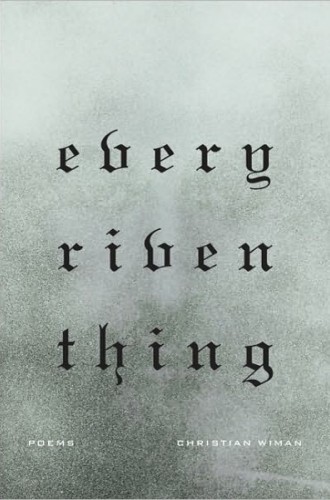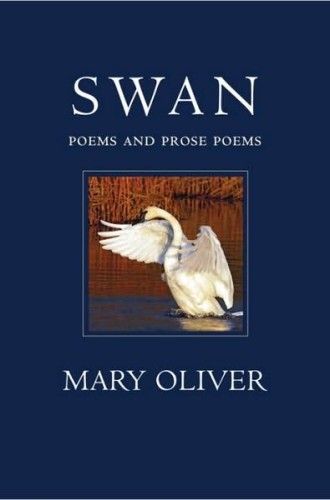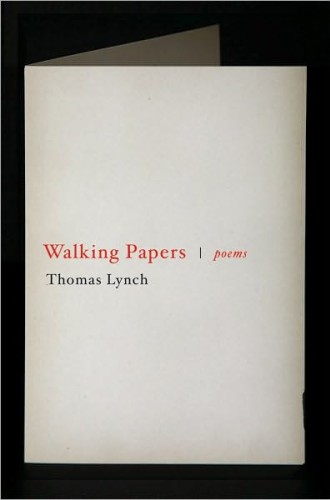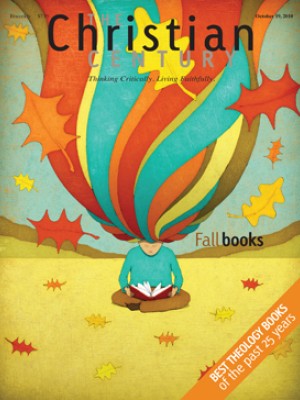A review of Every Riven Thing, Swan and Walking Papers
Two questions for today: First, why read poetry? I mean, really—who cares? Who has the time, not to mention coin, when you could be reading tremendous novels and stunning essays? And second, what is great poetry? Is there really such a thing, or is the idea merely a canard sold by a cabal conspiring to foist such inaccessible murk as The Waste Land on us by calling it great when you know and I know that no one understands hardly a shred of it?
Some tiptoeing toward answers: Poetry is "memorable speech," said the (great) poet Wystan Hugh Auden, "about birth, death, the Beatific Vision." Or, in less lovely words: good poetry, great poetry, is the distilled salt and song of the way we speak; it is espresso speech, perhaps; it pierces and penetrates and illuminates, it makes us see fresh.
Read our latest issue or browse back issues.
Poetry is crucial to us as human beings, for speaking memorably and listening ferociously is perhaps how we best evolve and pray powerfully and stutter toward grace and peace and joy, toward a world where no child weeps and violence is a dark memory. If we do not, as a species, speak memorably and listen ferociously, we have no horizon, no map, no theme. Think, for example, of a world in which the thin Jewish man Yeshua ben Joseph did not speak so colorfully and memorably of forgiveness and grace. Would we have come even this far toward the Light?
I know there are some among us who court silence as their prayer, but I cannot imagine a world shorn of the music of language, the dance of words, the mysterious ways that lines and sentences and images conspire to awaken and elevate and inspire us. Yes, inspire; how very many times have we been lifted by songs and poems, chants and litanies, a twist of words that exactly caught the way we felt but could not say? More times than we can ever count, yes?
So, if we are serious about attentiveness—which is to say, if we are hard at work spiritually—we read poetry on the chance that it might move and startle and illuminate us, that it might be memorable in ways that other written (and sung) language is not. This is why we are so often left cold by lesser poetry, because many poems are merely precious, allusive, self-conscious and self-absorbed without being memorable, moving, startling or accessible. Sometimes I think that great poetry is the highest literary art because it has to claw past such an ocean of terrible muck.
But rising above the surface of the ocean are islands—some massive, like Yeats and Homer; and some smaller but no less riveting, like Constantine Cavafy and Wisława Szymborska. Some perhaps do not receive the trumpet flourishes they deserve because their egos and styles are so deliberately unadorned, like William Stafford and Les Murray and Mary Oliver; some have reputations built in other forms but are startlingly good poets, like Thomas Lynch; and some are young and getting better with each book, and make some poems that give you the joyful willies, like Christian Wiman.
Let's start with Christian Wiman, partly because he is so young (a mere 44) and doomed. As he began to discuss publicly three years ago, he has an inoperable cancer both rare and mysterious, one that kills some people quickly and some after decades. More than most of us, perhaps, he lives alert to the extraordinary gift of every moment. His diagnosis, along with his falling in love with the woman he married and a period when his writing "went dead," as he said, led to a conversion of sorts, from religious and spiritual apathy to a searing "sacred attentiveness, . . . a love so overflowing that it demanded God." Perhaps this awakening, which we might as well call grace, has given him a "strange and surprising excellence"—his own phrase about what distinguishes good poetry from adequate work.
Wiman's poetry was interesting in the past—accomplished, creative, a good read—but his book Every Riven Thing has some work that soars, that uses words and their music as wild prayers, questions, arrows:
My God my grief forgive my grief tamed in language
to a fear that I can bear.
Make of my anguish
more than I can make. Lord, hear my prayer.
This is haunting stuff—this is language turned and tuned to a pitch where it is both quiet scream and humble song. This is writing that leaps above all other things that we hairy reflective bipeds write. Every Riven Thing is an astonishing work that should be bought and read slowly; sipped, as you would anything fine and strong.
Speaking of fine and strong, let us consider Mary Oliver, and let us just state the obvious: she's the great American poet. For clarity and ardor, insight and access, eagle eye for wonder and miracle, blunt heart for pain and joy, she stands alone. She's been making her lean, naked, poetic prayers for 50 years, and she's better than ever, a grand master of the art of artlessness:
Finally I saw that worrying had come to nothing.
And gave it up. And took my old body
and went out into the morning,
and sang.
Her terse joy, her sinewy wit, her endlessly celebratory eye . . . the thought occurs to me, after I have read Swan twice through slowly, that if ever there was a poet making One Vast Book in her life, it's Mary Oliver. I think perhaps she passed into mastery years ago, and now nearly everything she writes is a lean, vibrant prayer, one vision after another of the Gift of What Is, caught with a pencil on the shores of Cape Cod. You can pick up pretty much any Mary Oliver collection and be thrilled, but Swan, like her recent The Truro Bear and Other Adventures, is so piercing and penetrating that form seems to fall away, an unnecessary stage for the rocket.
And finally the polymath Thomas Lynch—deft essayist, renowned chronicler of the undertaking life, recently the author of short stories (Apparition and Late Fictions), and here issuing his fourth book of poems. The most cheerfully talkative of the three poets here, the most interested in other people, the most given to anecdote and—bless him and grant him long life, Lord—the most prone to humor, Lynch is almost a stealth poet. His lines are so seemingly easy and effortless that you hardly notice the quiet craft as he just bubbles along telling a tale. If Mary Oliver is the easiest of these three poets to read, the most open and lean, Lynch is the easiest to hear. Of the three he is the one you want to hear read his own work aloud, for he is a seanchaí, a village storyteller in the old Irish tradition, with all the quiet attentiveness to cadence and rhythm beneath the seeming volubility.
Lynch also writes the longest poems—the epic "The Names of Donkeys" and a dry-witted series of poetic letters to President, Vice President, Madame Secretary, and Messrs. Attorneys General. A long poem is awfully hard to sustain, as anyone who has endured Milton can attest. But beneath the wit and verve of the lines of the remarkable Mister Lynch is almost a sadness, brave and graceful. Here is a poet who sees what is, who grapples daily with death and loss, but who cannot help but sing the painful joy of creation:
The hour's routine, the minute's passing glance—
All seem like godsends now. And what to make of this?
At the end the word that comes to him is Thanks.









